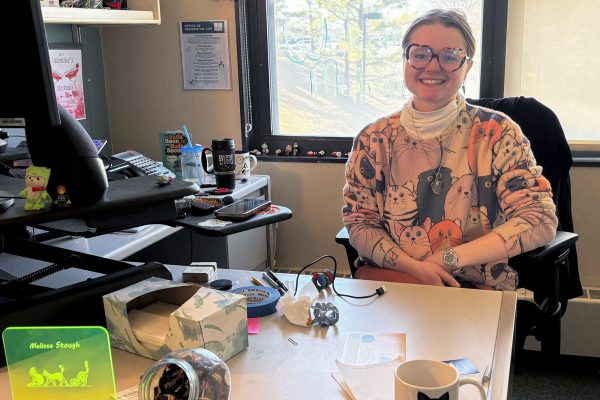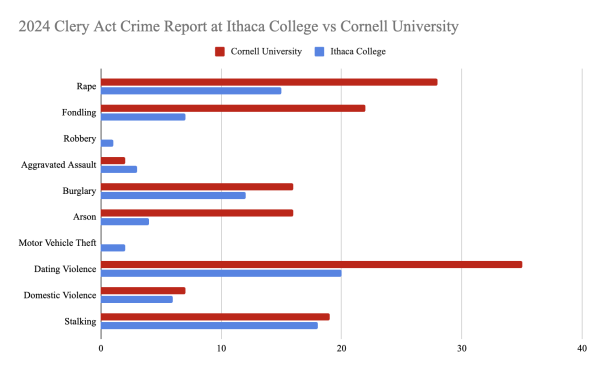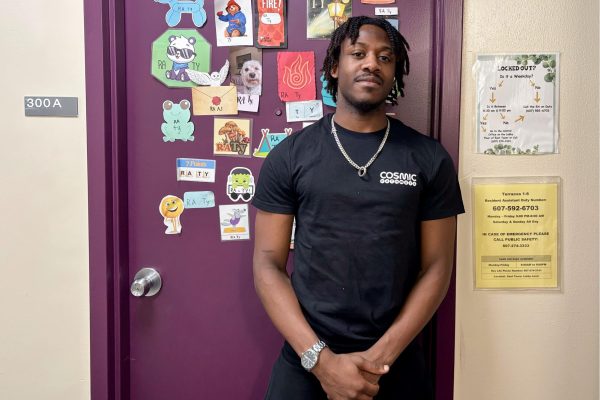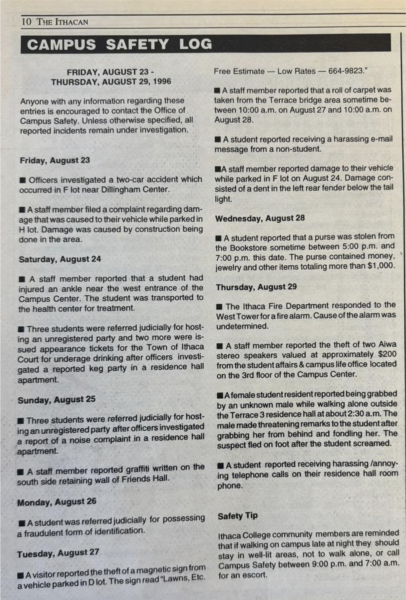
Ithaca College first-year student Chloe Sachs is putting in the work to stay safe on campus. The Terrace 8 resident said she and her roommate keep their door locked to prevent burglaries, a sentiment not shared by everyone in her building.
A student in the building had a PlayStation 5 stolen from their dorm in January of this year, according to the Public Safety Log published in the college newspaper The Ithacan.
Safety doesn’t look the same for everyone in Ithaca. Factors like police jurisdiction or student status can affect one’s safety. The first step to protecting yourself and your belongings when living in residence halls on the Ithaca College (IC) campus is keeping your door locked, officials and administrators say.
“Not everyone locks their doors because [Terrace 8] is so far away from everything that people are like, ‘oh, people won’t come all the way up here to steal my things because you have to go all the way up the hill,’ but that’s not necessarily always true,” Sachs said.
ResLife and student safety
Even though holding the door for the person behind you is an act of common courtesy in society, the same does not go for residence halls, safety advocates say. Upper Terraces Residence Director (RD) Melissa Stough encourages students to protect themselves by limiting who they let into the dorm.
“It’s nice to let people in, right?” Stough said. “When they’re like, ‘Oh, I forgot my ID,’ but how can you really trust that they actually live there?”
“Residents might get frustrated with me because I won’t let them into the building,” Stough added. “Like I’ll be leaving the building, and they’ll be like ‘wait, wait, hold the door’ and I’m like, ‘actually, no, I can’t. I don’t know if you actually live here.’”

IC’s safety responsibility
This sentiment is shared by the Ithaca College Office of Public Safety and Emergency Management (OPS). OPS is the sole law enforcement department for students on campus, employing fully deputized officers.
Deputy OPS Chief Thomas Dunn said IC students are protected by a “multi-layered” safety approach, which includes their deputized officers, residence assistants (RAs), RDs, and the Student Auxiliary Safety Patrol.
In addition to these safety efforts, the college creates the Annual Security and Fire Safety Report (ASFSR). This document is required by the Clery Act to promote campus safety through transparency, community alerts, victim support, and prevention education.
Elyse Nepa is the assistant director of Clery Act and Prevention Education. She called the ASFSR an “incredible resource” for anyone in the Ithaca College community to keep themselves informed with vital campus information: “I don’t think nearly as many people read it as they should,” she said.

According to Dunn and Nepa, OPS works hand-in-hand with other departments at IC to build up its reputation around campus and become a trusted resource for students.
“A lot of the work I engage in that is connected to [the Clery Act] is really connected to building trust and building relationships,” Nepa said. “Our team works really hard to be transparent with the community, and this is one of the ways we do that,” she added about the ASFSR.
One of the most critical relationships is with Ithaca College’s Residential Life employees, including RAs and RDs.
Ty Anderson is one of two RAs in the Terrace 2 residence hall. He says the ResLife-OPS relationship is driven by a common goal.
“It’s an active relationship because we’re both kind of in the same field of looking after the people that live on campus,” Anderson said.

A plague on both hills
An unlocked door let a burglar into Cornell University senior Jackson Andrews’ apartment. This intruder stole a backpack, notebooks, car keys, AirPods, wallet, and an Xbox from Andrews’ Collegetown residence.

Despite Andrews being able to trace his stolen items through the GPS in his AirPods to an apartment building, the police made no arrests as the GPS couldn’t identify the exact apartment within the building. “I lost around $1,000 in value, and I was a little upset that there wasn’t more effort put in [by the Ithaca Police Department],” Andrews said.
Ithaca Police Department (IPD) Chief Thomas J. Kelly said these types of investigations are driven by many factors. He added that Andrews’ backpack could have been in “a number of apartments” in the building identified by the GPS, and that the difficulty comes in narrowing down exactly which one the signal is coming from.
The IPD has been understaffed for more than two years. It employs 55 officers instead of a fully staffed 80-officer department, Kelly said.
“We have vacant positions, we’re actively recruiting. We have a new test in May, and then we’ll have another test in September,” Kelly said. “It presents a challenge, it takes some creativity.”
These vacancies force existing officers to work overtime and pick up extra duties and shifts to accommodate the understaffing.
“We’re primarily focused on the response and not prevention,” he said, “Unfortunately, we can’t meet all those requests.”
Public safety for students can look different depending on whether they are living on or off campus: “I lived on the Cornell campus in past years, which is generally very safe, moving into now Collegetown, which is definitely significantly less safe,” Andrews said.
Crime reporting and transparency
Transparency is lauded by the IPD, but the department halted publication of their previously weekly crime blotter, a record of crime in a city often kept by the police department or local government. Crime blotters are reported by Ithaca College’s OPS, the Cornell Police Department, and The Ithacan, making IPD the only major public safety organization in Ithaca not publishing this information. Back in 2022, the IPD replaced its community crime reports with the Community Dashboard.
While the Clery Act requires higher education institutions receiving federal funding to report campus crime data, the same does not apply to the police department. No law in Ithaca requires publishing an incident log for public access, however, some citizens and observers have taken issue with the new system.
Colin Drane, the CEO of SpotCrime, an independent crime reporting website, has criticized the replacement dashboard for not allowing the public a truly transparent view of IPD behavior: “If you can’t inspect the data, how can you trust it is correct? This is not transparent,” Drane wrote on X.
The Ithacan steps up
The Ithacan has been reporting its crime blotter for the community since 1996. Assistant News Editor Julian DeLucia thinks the weekly Public Safety Logs give students peace of mind and make the IC campus safer: “It helps keep people informed,” he said, “especially when it comes to certain issues.”

The Ithacan is a key campus organization with which OPS has a strong relationship. OPS will send The Ithacan the information they use for the logs directly in weekly emails to DeLucia: “The little considerations that we make to support our students and our community are really important,” Nepa said.
“Because it’s helpful for us as college students to get [crime reports] from our schools, I don’t see why that wouldn’t be helpful for people downtown, especially if you’re living right next to a building that is actually a hotbed for criminal activity,” Andrews said.
While there have still been no arrests in Andrews’ case, he’s taking precautions, saying he bought security cameras after the burglary and things are looking up: “Since the winter break between semesters we haven’t had any [burglary] attempts…at all. Before, we had them 2 to 3 times a week” he added.
Students and faculty at IC can take a deep breath because safety on campus will never take a backseat, as long as Nepa and Dunn are there: “A lot of people [in Ithaca] feel their sense of safety is in jeopardy, how can we support people and bring people together?” Nepa said.
“It’s really [all] about safety,” she said.






